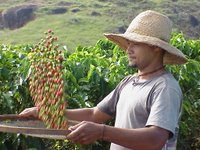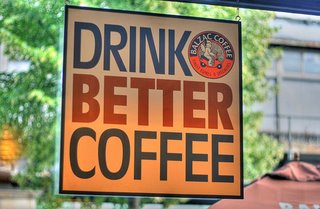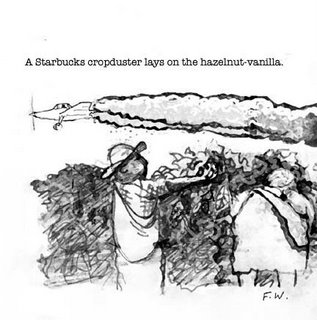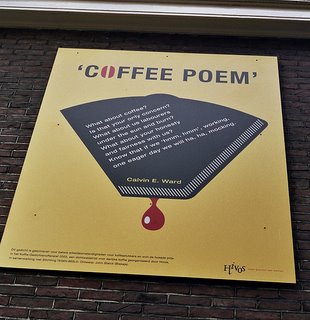 photograph by ann labate
photograph by ann labate
There’s a growing trend to help the world’s poor coffee growers earn a fair return for their beans
By John Lux
Gasoline is the most common international product you and I must make decisions about buying, but don’t ask the clerk at your local station if the workers who pumped the oil got a fair wage for their labor, or if the Earth was treated right when the oil was extracted.
But coffee, the second biggest commodity in international trade, has a face the consumer can really see. Most of the world’s coffee is grown by family farmers. And most of them can’t make a decent living because most of the profits from green coffee — the unroasted beans — go to wholesalers.
It doesn’t have to be that way, and the picture is slowly changing. Change is coming from movements such as Fair Trade Certification, an international program that ensures farmers are paid a fair price for their coffee, and from individual companies, such as Chicago’s Intelligentsia.
Geoff Watts, the head buyer for Intelligentsia, said that while Fair Trade has certainly helped many farmers, it doesn’t address quality issues and has limited scope in regard to environmental concerns. “It is basically a price support mechanism,” he said.
Watts makes regular trips to coffee-growing areas to find the best coffee and the best farming practices. “We buy 50 percent of our coffee from small farmers, who produce 500 or 600 pounds a year on small plots of land, also growing much of their own food. Most of them are in co-ops,” he said.
Watts said there’s nothing wrong with larger farms if they do things the right way. He cites the Finca Malacara operation in El Salvador’s Santa Ana area, one of the producers Intelligentsia buys from. The owner pays good wages and has built a health clinic and day-care center. “I pay one guy but the money supports a lot of people,” Watts said.
Watts believes Fair Trade Certification also has helped the quality of the coffee. “When buyers squeeze growers on price, they’re hurting themselves because quality suffers when growers are in debt and can’t pay people to do the job right.”
Coffee Economics
Most coffee is grown in the tropical areas of Africa, Asia and Latin America. While there are major commercial plantations, notably in Brazil, most of the world’s coffee is grown by family farmers scratching out a living on small plots of land in poor countries. The International Coffee Organization estimates that Colombia, for example, has 560,000 coffee growers and the industry accounts for 30 percent of total rural employment.
Because it takes about four years for a coffee tree to bear fruit, it isn’t easy for these small farmers to adjust their production to changing market prices. So when prices are high, farmers plant more trees, but by the time the trees bear fruit, supplies are rising and market prices fall. Because the current price might not even cover the cost of production, coffee farming families — both those who own their own land and those who labor for others — suffer. With no real social safety net, some of these farmers are in real danger of starving to death.
Fair Trade Coffee
Fair Trade Certification, begun in Europe 16 years ago and growing in importance in the United States, is a way for coffee drinkers to channel more dollars to coffee farmers, as well as to encourage sound environmental and social practices. Fair Trade coffee is bought from farmer cooperatives at $1.26 a pound ($1.41 for organic coffee), with individual farmers and cooperative social programs sharing the premium.
More than 85 percent of Fair Trade coffee sold in the U.S. is certified organic.
Fair Trade Certification proved a godsend to small farmers as coffee prices fell to an all-time low of 45 cents a pound in 2002. While prices have more than doubled since then, a bumper crop this year could send them down again.
TransFair USA is the third-party certifier of Fair Trade products in the United States, and the non-profit organization makes sure farmers and farm workers are paid a fair, above-market price and that sound socioeconomic criteria are met, using increased Fair Trade revenues.
TransFair, based in Oakland, Calif., says that in addition to providing price support, Fair Trade Certification ensures fair labor conditions for all workers on the farms; freedom of association for farmers and workers; lines of credit for cooperatives and environmental standards that restrict use of agrochemicals.
Higher Grounds Coffee
Small companies with a conscience, such as Higher Grounds Trading Co. of Leland, Mich., have found Fair Trade Certification a good way to go. Jody Treter, 30, and husband Chris, 31, founded the company in 2002, not so much to make money but to make the world a little better.
“We would shut our doors before selling anything but Fair Trade coffee,” Jody Treter said. “Our model is that of a non-profit. We pay living wages and we donate a lot of money” to the community, both their own in the Traverse Bay area and places where their coffee is grown.
The Higher Grounds operation is small — Jody Treter estimates it will gross less than $300,000 this year — and some months are profitable while some are not. While that may limit their donations, it doesn’t dampen their spirits.
“We are in an importing cooperative called Cooperative Coffees,” Jody Treter said. “The cooperative gives small roasters like us the opportunity to meet with small farmers.”
They buy coffee from Mut Vitz and Maya Vinic, two cooperatives in Chiapas, one of Mexico’s poorest states, and visit them each year. In addition, Higher Grounds is partnering with Catholic Relief Services in Nicaragua and also buys Fair Trade coffee from Sumatra, Ethiopia, Colombia and Peru.
While Higher Grounds sells 90 percent of its coffee in Michigan, much of it to churches, the company has its eye on the Chicago market, especially since the Fair Trade Futures conference will be held here in October. Higher Grounds’ main outlet in Chicago is the Wellington Cooperative in Lincoln Park.
Certification Red Tape
Intelligentsia’s Watts, while praising the goals of Fair Trade Certification, said the biggest problem with the program is the expense of certification and the time it takes to achieve it. And, he said, there are other ways to help the farmers.
Intelligentsia expects to contribute about $20,000 this year to a cooperative in Nicaragua that grows the Flor Azul coffee Intelligentsia sells. That is in addition to the money the co-op gets for the beans.
The cooperative is called Las Brumas (The Mists) and its 52 families benefit from a fund to build schools in the community.
But for the vast majority of Americans who don’t take the time to learn the policies of their favorite coffee roaster, Fair Trade Certification is useful shorthand for coffee that is good for workers and the Earth.
Mainstream Trade
Even Starbucks seems to be moving in that direction, although it will take a while to persuade its critics that the Godzilla of coffee shops isn’t just blowing PR smoke. Starbucks said it increased purchases of Fair Trade coffee in 2003 to 2.1 million pounds. Whole-bean Fair Trade coffee is sold in all American company-operated stores and the company says its purchasing guidelines give preference to farmers who score high in measurements of economic fairness, socially responsible working conditions, and progressive environmental practices.
Thinking Man’s Java
Michael James, co-owner of Rogers Park’s Heartland Café, has been a leader in healthful eating and progressive politics for 30 years, but he’s a fairly recent convert to the organic and Fair Trade movements.
Since he opened Heartland in 1976, he’s been buying coffee from family-owned Community Coffee of Baton Rouge, La. (“I became addicted,” he said.) “We’re moving in the direction of Fair Trade and organic coffee,” James said. “We sell Fair Trade coffee from Equal Exchange Coffee of Massachusetts both in the store and as a coffee of the day, but you’ve got to ask for it. It costs 25 cents a cup more, but people don’t mind paying it.”
He brews mainly Intelligentsia coffee both in Heartland and the companion No Exit Café, but choices are increasing. The store within the café carries Coalition Café, an organic Fair Trade coffee that benefits the Chicago Coalition for the Homeless.
“I avoided going organic over price, trying to keep the cost low for consumers,” James said. “I started changing a few years ago.” Health was one of the reasons. “In my 60s I started to have pains I didn’t want to have and shifted to a conscious diet. I find myself feeling very, very good.”
Originally published inn the September issue of Conscience Choice
http://www.consciouschoice.com/2005/cc1809/coffeemain1809.html
John Lux is a Chicago-based freelance writer who likes his morning coffee with a shot of social conscience.











